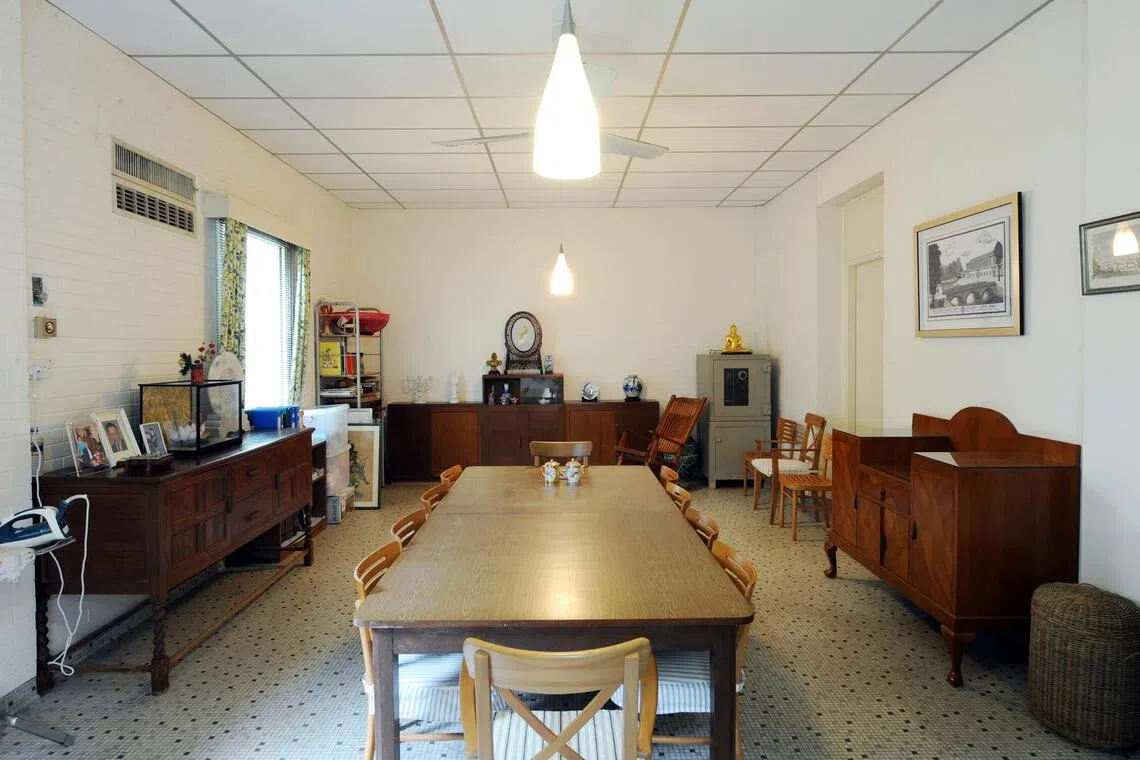Basement dining room at 38 Oxley Road considered ‘less private’ than other parts of house by Govt
Sign up now: Get ST's newsletters delivered to your inbox

The basement dining room at 38 Oxley Road is widely regarded as the most historically significant part of the house.
PHOTO: ST FILE
Follow topic:
- Government will honour Lee Kuan Yew's privacy wishes by removing traces of private spaces from 38 Oxley Road.
- The government may convert 38 Oxley Road into a public space and will consider potential traffic and parking impact on residents if the site is acquired.
- A decision on gazetting the site will be made after objections close on Nov 17.
AI generated
SINGAPORE – Spaces in 38 Oxley Road that have been documented in different forms of media, including the historically significant basement dining room, are considered “less private” by the Government, Acting Minister for Culture, Community and Youth David Neo said on Nov 6.
Responding to Mr Ang Wei Neng (West Coast-Jurong West GRC) about what constitutes private living spaces on the site of founding prime minister Lee Kuan Yew’s family home, Mr Neo said that there are spaces, such as bedrooms, that “do not have any association with the historically significant events that took place at the site”.
Mr Neo had earlier repeated the Government’s position that it will respect Mr Lee’s wishes for his family’s privacy to be maintained by removing all traces of their private living spaces from the house at 38 Oxley Road.
To respect Mr Lee’s wishes, said the acting minister, personal spaces such as bedrooms are likely to be “reconfigured or removed”.
This could “range from removing furnishings, fixtures or any objects still left, to potentially also tearing down such spaces”, he said.
The acting minister on Nov 6 spent 50 minutes in Parliament responding to clarifications from 12 MPs on a 20-minute speech he had delivered.
In the speech, Mr Neo laid out the thinking behind the Government’s intention to gazette the site
Noting that public officers have yet to gain access to the site, Mr Neo said that the structural integrity and safety of buildings on the site will have to be ascertained before a decision is made on what can be removed.
The basement dining room is widely regarded as the most historically significant part of the house, and was where key players in 1950s politics – including the late Mr Lee – discussed their ideas for Singapore’s future
The National Heritage Board (NHB) and Singapore Land Authority (SLA) had said on Nov 3 that if the site is gazetted and subsequently acquired by the Government
A written notice of the Government’s plan to gazette the site was issued to its owner, Mr Lee Hsien Yang, on that day.
Other MPs, including Ms Joan Pereira (Tanjong Pagar GRC) and Mr Alex Yam (Marsiling-Yew Tee GRC), asked whether residents in the area and members of the public will get opportunities to give feedback on plans for the site.
Residents had earlier told The Straits Times that traffic congestion and illegal parking
Reiterating that a decision had not been made on whether the site will be gazetted as a national monument – such a decision will be made only after a period for objections closes on Nov 17 – Mr Neo said that Government agencies “will conduct a holistic feasibility study on the potential options and the future use” if the site is acquired.
He said beyond considering the site’s use, the study will assess how future use will impact traffic and parking, and how public access can be granted without causing disamenities to the surrounding area.
“We will also engage residents, and we will consider their feedback as part of this process,” he said.
If the site is made a national monument, public agencies will also “identify possible stakeholder groups and conduct engagements to help shape the future of the site, and to ensure that the potential of the site for public education is maximised”, he said.
Those invited to give their views could include heritage enthusiasts and educators, as well as those who represent different demographic groups, such as young people and seniors.
At present, the landed housing area designation for 38 Oxley Road and its surrounds limits the height of buildings within the area to two storeys. Ms Gho Sze Kee (Mountbatten) asked if this designation will remain.
Mr Neo said that until a decision on whether the site will be gazetted as a national monument is made, “it will be quite premature for the Government to review the planning and development controls for the neighbourhood”.
Associate Professor Jamus Lim (Sengkang GRC) asked how the NHB’s Preservation Sites and Monuments Advisory Board weighs public interest against private ones before deciding if a site should be gazetted.
He cited Mr Lee Kuan Yew’s wishes for the house to be demolished and its current owner Mr Lee Hsien Yang’s application for it to be torn down, beginning his clarifications by declaring that the Workers’ Party has received “financial contributions from certain members of the Lee family associated with the Oxley property”.
These contributions were declared under relevant regulations, he said, adding: “Nevertheless, we have received neither request nor guidance to speak on this matter, and the statements and questions that follow are entirely our own.”
In response, Mr Neo said that the advisory board scores potential national monuments based on technical merit and does not consider other things, such as an individual’s wishes.
He added that the criteria all potential national monuments are assessed on follow international best practices. The assessment, he said, includes qualitative and quantitative assessment of the identified site’s national significance, historical merit and architectural design merit.
Singapore’s advisory board comprises experts from various fields such as architecture, history and conservation, and is tasked with assessing the worthiness of potential national monuments identified by the NHB.
On the need to acquire the site if it is gazetted as a national monument – something Mr Foo Cexiang (Tanjong Pagar GRC) had sought clarity on – Mr Neo said that such a move is the best way to serve public interest.
“The Government has the resources and the expertise at its disposal to ensure that the site is properly maintained, and it is maintained in a manner that will be able to benefit Singaporeans,” said Mr Neo.
Mr Gerald Giam (Aljunied GRC) asked if an independent valuation of 38 Oxley Road would be carried out before acquisition, and if the cost of acquisition would be made public even if established processes do not require such disclosure.
Mr Neo had earlier said that any acquisition of the property would be done in accordance with the Land Acquisition Act, and that a professional private valuer would be appointed to assist SLA to determine the market value of the land.
In December 2015, then Prime Minister Lee Hsien Loong and his younger brother Lee Hsieng Yang came to an agreement for the elder Mr Lee to sell his younger brother the house at fair market value.
The elder Mr Lee gave what he had received to charity, while the younger Mr Lee donated half the value of the house to charity.
Then PM Lee said in 2017 that the donations were made so that the Lee family would be seen “not to be benefitting financially from 38 Oxley Road either through receiving compensation from the state for acquisition, or resisting acquisition or preservation or conservation to profit by redeveloping and selling the property”.
Asked by Mr Giam if the cost of acquisition will be disclosed, Mr Neo said: “I am not totally au fait with what is required under the Land Acquisition Act, but my commitment to the member is that due process will be given and it will follow the requirements under the Land Acquisition Act.”
The acting minister added: “If the Act requires a disclosure, the disclosure will be done as well.”


